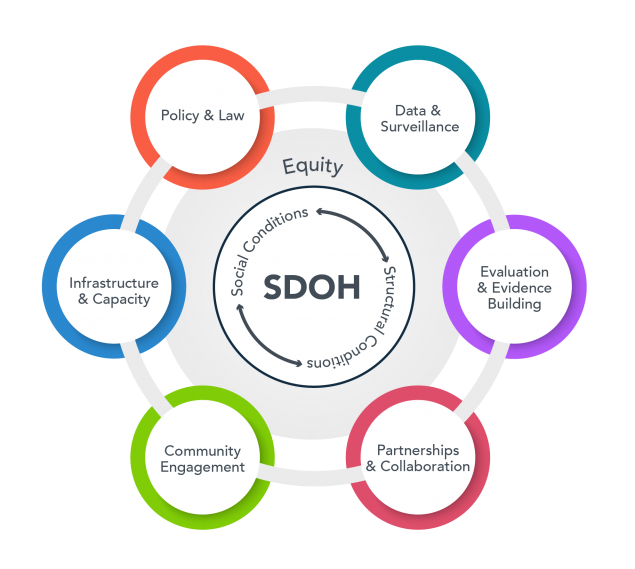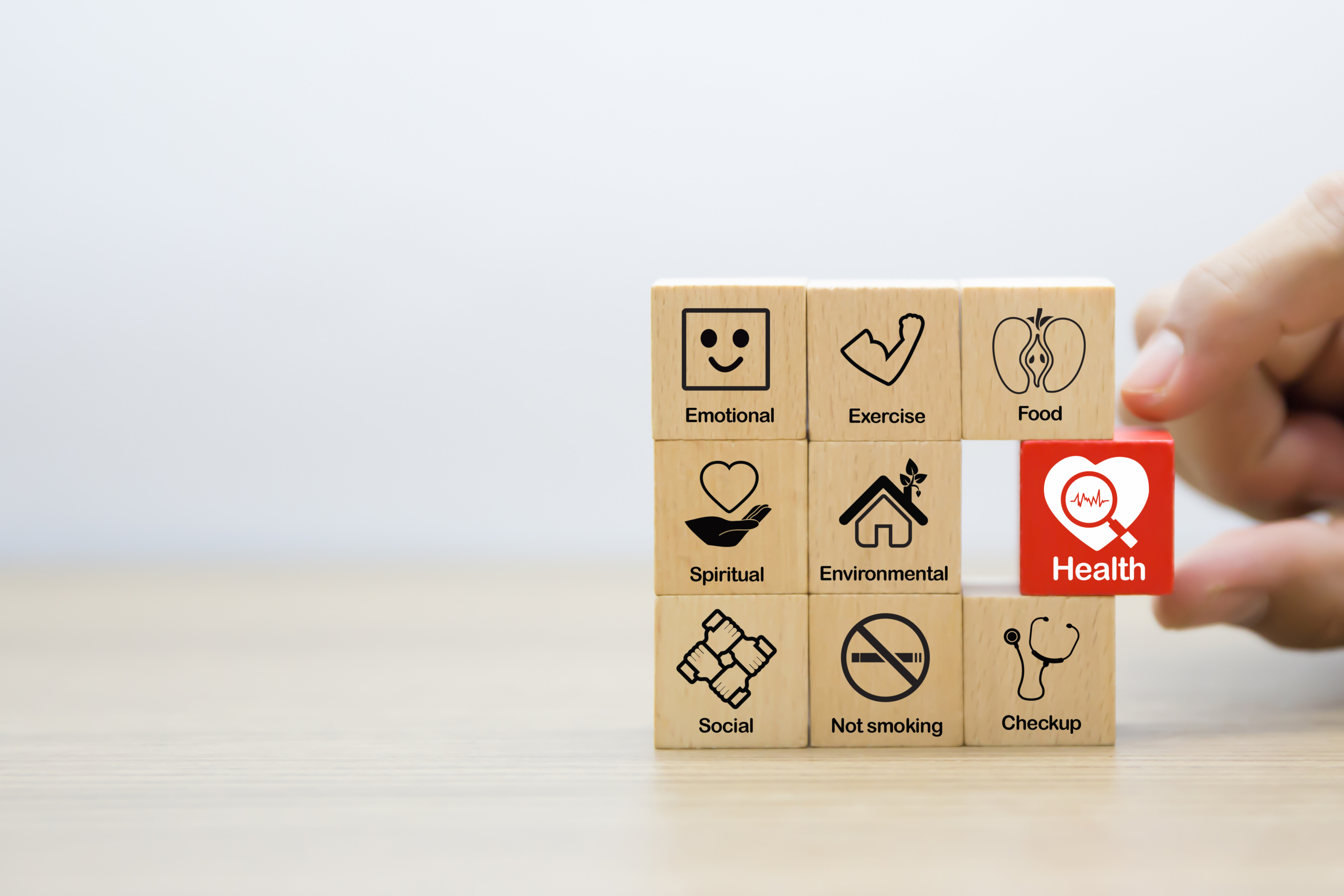As our parents age, understanding the social determinants of health—the factors that shape our health outcomes—becomes increasingly important. Social determinants can include income level, education, access to healthcare and nutrition, neighborhoods, and even support from family and friends. As our parents age, it’s important to make sure they have the best quality of life possible. This means looking at social determinants of health.
Social determinants of health are defined as the conditions in which people are born, grow, live, work and age. These conditions include economic stability, education, neighborhood and physical environment, access to healthcare services and other social resources. All these factors can have a major effect on the health of individuals—especially our aging parents. If you feel you need help or support in managing the care of your aging parent, consider speaking with an advocate to see what assistance can be provided.
Let’s take a look at how these social determinants affect our aging parents, and what we can do to help them live healthier lives.

Many of us don’t realize there is actually a stigma to getting old. It has been defined as ageism. It is the negative perception or attitude towards the aging. Added to everything else our aging parents have to deal with, this gets added into the mix. Let’s look at all the factors that affect our aging parents in having healthy and enjoyable golden years.
Ageism
• Age is often used to categorize and divide people in negative ways.
• This is known as ageism, which is the stereotypes, prejudice and discrimination towards others based on their age.
• Ageism leads to harm, disadvantage and injustice across generations.
• The Decade of Healthy Aging (2021–2030) has four focus areas, one being the combatting of ageism.
• Changing attitudes towards age and ageing is essential to make progress on the other three action areas.
• These other actions include developing communities that promote older people’s abilities, delivering person-centered integrated care and primary health services, and providing long-term care for those in need.
Income Level & Education
One of the most significant social determinants of health is income level. Low-income households are more likely to experience poorer health outcomes than higher-income households due to limited access to quality healthcare, proper nutrition, and other resources. In addition to income level, educational attainment is also a major factor in determining an individual’s overall health status. Studies have shown that people with higher levels of education tend to have better overall physical and mental health than those with lower levels of education.
If your aging parents are among those with a lower income level and living on their social security, it is important to find out what free or low-cost resources are available to them. Contact your Senior Center, Center for Aging, Aging and Disability Resource Center, Department of Health and Human Services, or whatever it may be called in your county. These are government agencies in every county across the country and are your first place we recommend checking for resources for your aging parents. The office will have a case worker do a functional assessment, including a financial assessment to see what services or resources might be available to your elderly parents or grandparents. If you are an aging spouse, please reach out to this agency and see what assistance you may qualify for.
Education plays a major role in determining the overall health of an individual because it has the potential to open up opportunities that would otherwise be unavailable. Having access to higher education could lead to better job opportunities with higher wages; making it easier for someone to afford quality healthcare or healthier food choices that are not always available at lower-income levels. Education can also provide individuals with knowledge about healthy lifestyles, so they are better able to make informed decisions when it comes to their overall wellness.

Economic Stability
Financial security is an essential factor in determining an individual’s overall wellbeing. Inadequate income can lead to increased stress levels and poor nutrition due to lack of resources; both of which can result in negative impacts on physical and mental health. Economic instability can also lead to difficulty accessing quality healthcare for preventative care or treatment for chronic diseases. Additionally, if an individual cannot afford adequate medications or treatments prescribed by their doctor, then their overall health will suffer.
I will make a statement here on medications. Often times we see that medications are not picked up after a hospital discharge because they find it too expensive. Many times, the healthcare professionals are not aware of this and incorrectly assume that the patient is taking their medications as directed. Not having their medications can obviously have a detrimental effect on their health. If you are aware of your aging parents needing newly prescribed medications for any reason, make sure they can afford it. The clinic is often a good resource for finding less expensive alternatives, but they don’t know unless they are made aware. For example, my mother-in-law hadn’t refilled her medications since the end of last year. Her blood pressure medication doubled in cost for her for a 3-month period. We reached out to her doctor, and she was able to work with us and her Medicare Advantage Plan Formulary to choose an alternative with using the same medication but taking a combination of a different dose and reduced her medication to even less than last year.
Advocating for your aging parents can be time consuming but necessary. Even the small things you think are simple can fall through the cracks. If you want help or are looking for someone to pick up some of the responsibilities, consider hiring an advocate to lighten your load and help you make sure your aging parents are getting the best care possible by offering you guidance, education, and support.
Physical Environment
Another important social determinant of health for aging parents is the physical environment in which they live. This includes things like air quality, water quality, noise pollution, housing conditions and more. For example, living in an area with poor air quality can be detrimental to respiratory health while living in a noisy area can cause stress and anxiety levels to rise. Ensuring that our aging parents are living in safe environments with clean resources is essential for their health and wellbeing.
Here in our community in the State of Wisconsin we are surrounded by 4 of the top 10 poorest counties in the state plus we are very rural. Rural communities also share in many challenges to access quality healthcare for your elderly parents. Transportation to medical appointments can be difficult. Rural community hospitals take on the burden of caring for our aging often times since Covid, that our larger tertiary hospitals would normally care for but their ability to take patients is often poor. These larger hospitals are often an hour or more away and this places increased burden on families and transportation.
Often times assisted living can be supplemented or paid for with medical assistance programs. Again, your aging resource center in your county is the place to start.

Access to Healthcare & Services
One of the most important social determinants of health for aging parents is access to healthcare and services. This includes having adequate medical care, such as regular checkups with a primary care doctor or specialist, as well as access to prescription medications and other treatments. Additionally, aging parents may need help with transportation or home care services if they are unable to do certain tasks on their own. Making sure that our parents have adequate access to all necessary healthcare and services is vital for their well-being. If your aging parent is a Veteran, they may qualify for the Home-Based Primary Care program. This brings your team of healthcare professionals including your provider to your home. This program is designed to assist our Veterans that have difficulties leaving their home and still need quality healthcare.
Having access to qualified healthcare professionals is essential for maintaining good health as we age. Unfortunately, many low-income seniors lack this necessary resource due to limited financial means or difficulty navigating complex medical systems. Additionally, accessing nutritional support—such as food banks or meal delivery services—can be difficult for seniors living on a fixed income or without reliable transportation. Without proper nutrition in their diet, older adults are more susceptible to illnesses such as diabetes or heart disease. If you do not live near your parents, consider hiring an advocate to help manage their care and give you the peace of mind that they are well taken care of.
Having easy access to healthcare services is critically important for our aging parents as they face increasing medical needs with age-related illnesses such as arthritis, diabetes or high blood pressure. Without proper access to quality medical care, our parents may not receive timely diagnosis and treatment for their medical issues; resulting in reduced quality of life or even death from conditions that could have been prevented with proper care.
Social Support System
Lastly, it’s important for our aging parents to have a strong social support system around them. Having close friends or family members nearby can provide companionship and comfort during times of need, as well as help with everyday activities such as grocery shopping or running errands. Additionally, having a good support system can reduce feelings of loneliness or isolation that often come along with aging. It’s important for us to make sure our parents have ample support when needed so that they feel secure and loved throughout their later years in life.
This can be especially important with our elderly parents as their social and support circles are getting smaller. Friends and family members are passing away and this makes them feel even more isolated. We need to help our elderly stay busy and enjoy the activities that they enjoy doing. Senior Community Centers often have social gatherings, card gatherings, and other social events to keep our seniors engaged with companionships.

Neighborhoods & Support Systems
The neighborhoods where we live can play a huge role in our overall well-being as we age. For example, seniors who live in areas with high crime rates may feel unsafe walking around their own neighborhoods at night or leaving their homes alone during the day due to fear of harassment or assault. Lack of access to safe outdoor spaces can also have an impact on physical activity levels among aging adults living in dangerous neighborhoods. Lastly, having a strong support system is essential for helping seniors maintain good mental health into their later years; without family members or close friends nearby, it can be difficult for aging adults to find emotional support when needed most.
Conclusion:
The social determinants of health play an integral role in the wellbeing of our aging parents. From having access to healthcare services, living in safe environments with clean resources, to having ample social support -all these things contribute greatly towards giving them the best quality of life possible during their golden years! We must prioritize these factors when caring for our elderly loved ones in order to ensure they remain healthy and happy throughout the remainder of their lives!
Social determinants of health have a tremendous impact on our aging parents’ physical and mental wellbeing; it’s up to us as adult children (or caregivers) to look out for them by doing whatever we can do ensure they have access to all the necessary resources they need. By understanding the various social determinants that influence our parents’ well-being and taking steps accordingly, we can make sure they lead full lives free from unnecessary stressors or hardships caused by poverty or other external factors beyond their control. You may want to consider our Step One Webinar and Workshop that takes a look at your aging parents and identifying what needs may need to be addressed with them living safely at home.
It’s important for adult children of aging parents to understand the social determinants of health so that we can do what we can do help improve their lives and maintain their wellbeing into old age. By understanding economic stability, educational opportunities, access to healthcare services and other social resources, we will be better equipped to ensure our loved ones remain healthy despite any socio-economic challenges they may face. With this knowledge under our belt, we will be able to provide them with the best possible support while they age gracefully!
As always, please reach out for a free 30-minute consultation to discuss your particular situation and determine what your needs are and how we can help. We will share information and at least 3 ways to help your situation. Following that call, it is entirely up to you if further services are desired.
As a free resource we have our private online community called “Speaking Out on the Care of Your Aging Parents” where we discuss issues, share information, and we provide tips and strategies to help you on the journey of a labor of love in caring for your elderly parents.
Take care and we will see you back here soon,
Pam and Linda
Your Nurse Advocates
Resources
Your Nurse Advocate Consulting, LLC
Your Nurse Advocate Consulting YouTube Channel
https://www.welfareinfo.org/poverty-rate/wisconsin/compare-counties/
https://www.cdc.gov/about/sdoh/index.html
https://www.who.int/health-topics/social-determinants-of-health#tab=tab_1
https://www.thelancet.com/journals/lancet/article/PIIS0140-6736(21)00524-9/fulltext
https://www.nia.nih.gov/about/aging-strategic-directions-research/goal-health-disparities-adults




